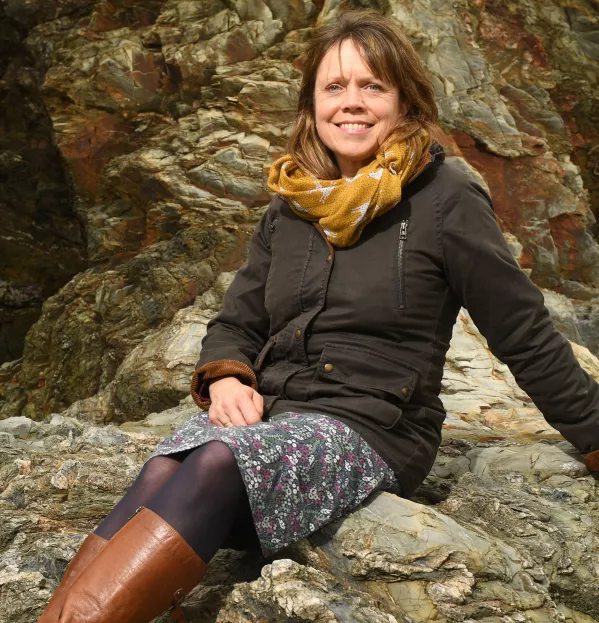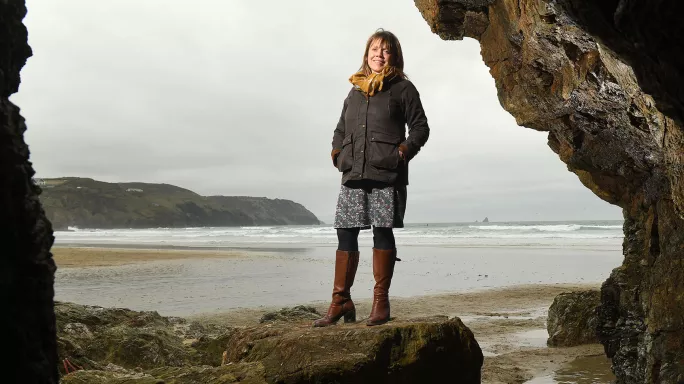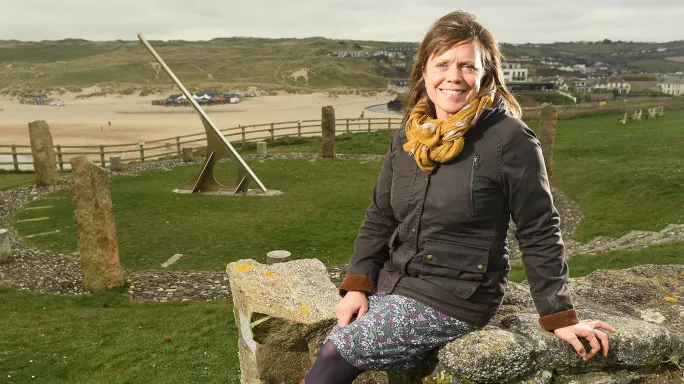- Home
- Leadership
- Strategy
- 10 questions with... Jennifer Blunden
10 questions with... Jennifer Blunden

Dr Jennifer Blunden is the chief executive of Truro and Penwith Academy Trust, a multi-academy trust formed of 34 schools across Cornwall, including one of the smallest secondary schools in the country, Cape Cornwall School, which has just 232 pupils.
Answering Tes’ 10 questions, she discusses her own educational experiences; why working in Cornwall makes her aware of the inequalities in education, including relating to funding; the need to ensure that services around schools are better resourced; and why leaders have to learn to take calculated risks.
1. Who was your most memorable teacher?
It was my secondary school headteacher, Miss Pugh.
I loved infant school and junior school and have lots of great memories from there, but when I went to secondary school it was a bit of a nightmare. I hated secondary school and eventually I changed school.
The head at my new school, Miss Pugh, said to me, “Let’s do something different.” I started doing a couple of afternoons at a local stables, where she kept her horse. Having that opportunity to do something different, knowing that I had that to look forward to after school, helped me go back.
She changed my education experience because she was very student-focused and, as I got older, I could see that someone taking the time to listen and have an individual approach really worked. It’s the sort of thing I’ve taken into my own leadership.
More Tes’ 10 questions:
- Lorrayne Hughes, chief executive of Cumbria Education Trust
- Moira Marder, CEO of the Ted Wragg Trust
- Adrian Ball, chief executive of the Diocese of Ely Multi-Academy Trust
2. What were the best and worst things about school?
The best things were my friendships and the teachers who brought subjects to life - science, geography, history and music. I really wanted to be in those lessons.
The worst bits were teachers who turned a blind eye to name calling or when a pupil was pushing you in the back. They just let that low-level persistent disruption happen. They are the sort of teachers I don’t want in my schools.
3. Why do you work in education?
One of my very earliest memories is being at home lining up my teddies in front of a blackboard with some chalk and teaching them - so I guess it’s always been there!

Then my own experience of education really pushed me to think about social justice, equality and equity, and making sure that everybody has an opportunity to have a really good education and is able to do anything with that education.
As part of that, when I left secondary, I went into vocational education on a land-based course. And that was brilliant. That taught me that education has to be about teaching the whole child, not just about trying to get a collection of grades for GCSE or A level.
It is vital that we value skills and vocational education and learning equally [with academic education] so that young people have the confidence, resilience, problem-solving skills and leadership to move forward with their lives.
4. What are you proudest of in your career? And what do you regret?
What I’m proudest of is easy - I am really proud of the trust I lead. I was there at the beginning when I was director of teaching school at the college that sponsored our trust, and I became chief executive a year later. From there we have grown to 34 schools and I’m really proud of that.
I’m also proud that we have managed to make our funding model work because we have a lot of small schools, both primary and secondary, often in isolated communities. From a business point of view we’re on a tricky wicket.
But we make it work and weather the storms of inequality that we face in Cornwall from the funding system, which I think is a real injustice. Why should our schools gets less funding than elsewhere in the country?
That leads to one of my regrets, which is that the national funding formulae has stalled and we don’t have a system for our schools. That is a real challenge. We’ve made it work but it’s involved trimming budgets, and it’s starting to have a significant impact on education.
5. Who would be your colleagues in your perfect school staffroom?
It would be filled with people who love what they do, who love where they live, who have empathy and respect for one another and their pupils, and who love inspiring others and enjoy collaborating.
Also people who have opinions and embrace new ideas and innovations, and have ambition for all the children and young people in their schools. So it would be a really vibrant and positive staffroom.
6. What are the best and worst aspects of our school system?
The best parts are where we allow teachers to develop inspiring and ambitious curricula, to adapt their teaching to meet the needs in their classroom, and to create really inclusive classrooms.
And multi-academy trusts are a great example of where - when they are set up with the right culture, ethos, vision and values - this can happen, with the agility to embrace new opportunities.
For me, the worst parts are where services around schools, such as child and adolescent mental health services or services for supporting our most vulnerable families, have been decimated.
This means everyone is now looking to schools for answers, but schools are meant to be part of an integrated system. So in some areas schools can only provide a tokenistic level of support because of the loss of integration from other services.

The other big issue is the postcode lottery of funding, which isn’t fair for children across the country.
7. Who in education has influenced you the most?
One is Sir David Carter [former national schools commissioner] because he really inspired my early days of being a trust leader. Some of his words that I still quote to our teams are about all schools being givers and receivers of support.
The other person is Leora Cruddas, chief executive of the Confederation of School Trusts. She has been hugely influential on my thinking. She also opened my eyes to Owen Eastwood and his work on belonging. As our trust has developed our own culture, ethos and values, it’s something we’ve fully embraced.
8. If you became education secretary, what would you do?
I would focus on this notion of fair funding for all pupils and on integrated systems and services around schools to support our most vulnerable pupils.
Also I would have a relentless focus on poverty and narrowing the gap between our most disadvantaged pupils and others in order to improve life chances.
I think if we were to focus on those areas we would impact on the recruitment and retention crisis, too, because we would ensure that our trusts and our schools could be optimistic, professional places for teachers, support teams and leaders to work and develop their careers.
9. What will our schools be like in 30 years’ time?
I hope our schools will be using technology in a way that continues to inspire children and young people to learn but also to solve the problems of the future.
But I also hope we are connecting children to their living environment so they understand things like where our food comes from, what the health benefits are of being outside in a natural green space and so on - that has to be a priority.
I also hope we have a system where academic excellence is on a par with vocational and skills-based excellence - that will be the best outcome for our economy but also for society.
10. What are the most important lessons you’ve learned doing this job?
Keep your thinking child- and pupil-centred, embrace equity and recognise that our most vulnerable and most disadvantaged pupils sometimes need that leg up to achieve the very best of their abilities, with no glass ceilings.
I think a sense of belonging is inherent at our best schools because a school is more than a national curriculum, or lesson plans. It’s about people who connect with others in the classroom, in the staffroom, and make lives better through opening eyes to learning.
It’s also about taking calculated risks; looking at creativity and innovation and being able to ask, “How can we do this better? How can we do this differently?”
Finally, it’s about balancing the day job with your own life. That’s been a key lesson for me around keeping some perspective and taking opportunities to look after yourself.
Dr Jennifer Blunden was talking to Dan Worth
You need a Tes subscription to read this article
Subscribe now to read this article and get other subscriber-only content:
- Unlimited access to all Tes magazine content
- Exclusive subscriber-only stories
- Award-winning email newsletters
Already a subscriber? Log in
You need a subscription to read this article
Subscribe now to read this article and get other subscriber-only content, including:
- Unlimited access to all Tes magazine content
- Exclusive subscriber-only stories
- Award-winning email newsletters



